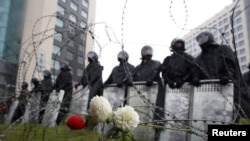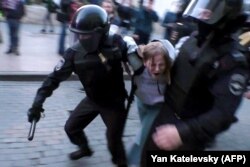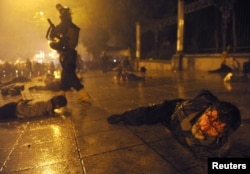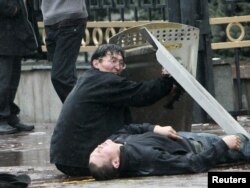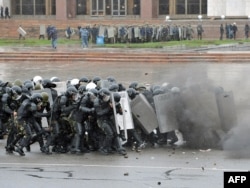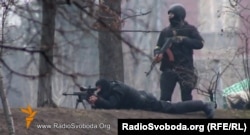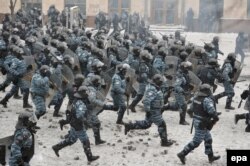After hundreds of detentions, graphic footage of severe injuries, allegations of torture, and a handful of deaths and abductions, Belarus’ police response to protesters has prompted a range of international condemnations.
But what lessons are regional law enforcement professionals themselves drawing from how Belarusian police have handled protesters rejecting President Alyaksandr Lukashenka’s official August 9 reelection?
Four former and current law enforcement officials from Georgia, Kyrgyzstan, Russia, and Ukraine – all countries that have experienced milestone political demonstrations -- tend to see more in Belarusian police behavior to criticize than to copy.
Yet most of these interviewees avoided directly comparing that behavior to the performance of their own countries’ law enforcement. Others claimed a record of good conduct that international human rights observers likely would dispute.
In Russia, which has pledged to support Belarusian law enforcement, one police union leader attributed Belarusian security forces’ brutal crackdowns and detentions to a lack of forethought by President Alyaksandr Lukashenka.
When it comes to responding to demonstrations, Russian President Vladimir Putin “is more intelligent,” asserted Mikhail Pashkin, chairman of the Russian Interior Ministry and National Guard’s Moscow Interregional Union.
In Russia’s Far Eastern city of Khabarovsk, Pashkin noted, the police have adopted a hands-off approach toward ongoing protests against the July arrest of elected governor Sergei Furgal on charges of contracting the murders of several businessmen.
“They decided to let the people go [protest],” the union leader said of Russian officials. “Perhaps at some point they’ll get tired of going.”
“But Lukashenka didn’t wait for this and did something stupid,” Pashkin continued. “And now they’ll judge him in The Hague” at the International Criminal Court, he speculated.
No such case currently exists against Lukashenka in the International Criminal Court, which tries defendants for severe crimes against humanity.
Although the European Union, the United States, the United Kingdom, and the United Nations have all condemned reports of Belarusian police violence, Belarus’ Baltic neighbors – Lithuania, Latvia, and Estonia – are the only countries yet to have applied actual penalties for Belarus’ treatment of protesters.
Lukashenka’s government has dismissed the accusations against it as “unfounded” and calls international censure of its response to the demonstrations “intervention in domestic affairs.”
One former commander of Ukraine’s disbanded Berkut special forces, who came to deadly blows with protesters during Kyiv’s 2013-2014 EuroMaidan demonstrations, argued that the international community, in fact, uses a double standard toward police violence.
The international outcry against the U.S. for police suffocating detainee George Floyd in Minnesota and shooting dead suspects in other states has been relatively muted, noted the man, who asked to be identified only by his first name, Vyacheslav.
“But here in Belarus, there’s all this hype right away,” complained Vyacheslav, who now works for Ukraine’s National Police. “They only show how police employees use force, but no one shows how force is used toward them.”
International human rights organizations have found proof that some Belarusian protesters threw Molotov cocktails at police and lit flares during street gatherings on August 10.
But the bulk of the photo and video evidence appears to indicate Belarusian police using violence against peaceful protesters, they say.
To date, no Belarusian police officer has been prosecuted for mistreatment of protesters or detainees.
A former chief of Ukraine’s National Police, Khatia Dekanoidze, denounced Belarus for using a “repressive Soviet system [of law enforcement] that was never reformed.”
Belarusian police “are violating absolutely all the conventions that defend human rights” -- in particular, the rights to free speech and assembly, Dekanoidze charged.
“If representatives of law-enforcement organs do not defend human rights, but beat [people], use violence, they should understand that they also will be punished under the law,” she said.
Yet, as elsewhere in Eurasia, the path of police reform in Dekanoidze’s native Georgia has not always run smoothly in this area.
Allegations of torture, killings, physical abuse, intimidation, and violations of rule of law by Georgian police have persisted since ex-President Mikheil Saakashvili launched a radical makeover of Georgian law enforcement in 2004.
Georgian prosecutors’ investigations of these allegations often have been spotty and, at times, politicized, some human rights observers contend.
Dekanoidze, who ran Georgia’s police academy between 2007 and 2012 under Saakashvili, did not address such cases under the former Georgian leader.
Now an opposition politician running for parliament with the Saakashvili-co-founded United National Movement, she instead condemned more recent Georgian police behavior.
In June 2019, police in Tbilisi fired rubber bullets at protesters – causing some to lose their eyes – and extensively used tear gas in an attempt to disperse demonstrators enraged by an invitation to Russian Duma deputy Sergei Gavrilov to address the Georgian parliament and a visit by a Russian delegation.
“The force that the state uses should always be proportional,” Dekanoidze commented. “This is the most important standard.”
Artur Medetbekov, who served as deputy chairman of Kyrgyzstan’s State Committee for National Security between 2006 and 2008, also stressed that individual Belarusian law enforcement officers clearly have abused their authority.
“They scoop up people who are walking along the sidewalk, through an alley, or somewhere in front of residences," Medetbekov commented. “This surprises many people – not only the public in Belarus, but also in other countries.”
He attributed police abuses to officers who “give in to their nerves” when confronting protesters.
Yet, ultimately, the nature of the police response depends on the protesters themselves, claimed Medetbekov, who now chairs a group of Kyrgyz special forces veterans.
“If the protesters exceed their civil rights and there’re arson, pogroms, then, naturally, based on the situation, the senior leadership gives the command for tougher [measures]; sometimes even with the use of some especially harsh technical means,” he said.
Nonetheless, he underlined, official complaints about police abuses should always be filed since there are “norms, rules, special orders” that police have been trained to follow.
How best to hold abusive police accountable appeared a moot point for others.
Former Berkut commander Vyacheslav drew the line at kicking protesters or hitting them in the collarbone, head, or eyes, but emphasized that police have to think on their feet during mass demonstrations.
“You need to take a decision very quickly. And that right is given to him,” he said of riot police officers.
During the EuroMaidan protests, scores of protesters were killed or wounded, including by the Berkut special forces. The unit was later disbanded under President Petro Poroshenko.
Yet despite the charges filed against Berkut officers for the violence, Vyacheslav claims that he has never heard “an illegal order” during 30 years in Ukrainian law enforcement.
The Berkut, he alleged, generally looked on the EuroMaidan demonstrators as “our citizens” and shared their dissatisfaction with the rule of then President Dmitry Yanukovych.
Like Vyacheslav, Russian police union boss Pashkin also downplayed police responsibility for violence against protesters.
He conceded that Russian law enforcement can get tough during detentions or toward prisoners in a police van. But, despite extensive reporting to the contrary, Pashkin claimed that Russian police do not “break anyone’s arms,” torture, beat, or mock protest participants.
Belarus and Russia, he underlined, have “a totally different situation.”
In 2019, though, Russia paid the equivalent of $9.5 million to citizens in brutality cases adjudicated by the European Court of Human Rights.
For ex-Berkut commander Vyacheslav, that might just reflect reality.
“Throughout the world, police act the same,” he said. “If they have the right to use force, they’ll use it.”
-This story was written by Elizabeth Owen based on ‘Дубинки по назначению’ и ‘их ждет суд’: Что о действиях силовиков в Беларуси говорят их коллеги из Украины, России, Грузии и Кыргызстана by Current Time Digital’s Tetiana Iarmoshchuk and Sergei Danilochkin. The English version contains reporting by The Moscow Times.




